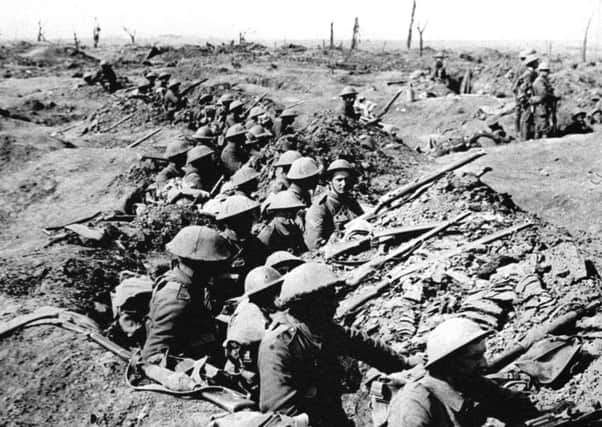'˜Talk of us in the reserve trenches is rot. We were in the firing line all the time'


Growing up Henry lived at 120 Spencer Road, and was a member of Ebrington Presbyterian Church in Londonderry.
As a young boy at aged just 15 years old, Henry saved another’s life.
Advertisement
Hide AdAdvertisement
Hide AdAs he walked home in his best Sunday clothes from Church past the Craigavon Bridge he noticed a man was in distress in the River Foyle. He quickly descended to the bank, noticing a passing soldier preparing to save the man, Henry dived into the water and helped the man to safety. For Henry’s astonishing bravery he received the Royal Humane Society’s Honorary Testimonial on Vellum.
On February 22, 1898, Henry married a young Margaret (nee Jackson) Allen from Dungiven Road.
Throughout their marriage, Margaret gave birth to 10 children called William John, Martha, Henry, Margaret, Joseph, Samuel, David, Ellis and Robert. Unfortunately one had died in infancy. The couple’s youngest son, Robert, was born whilst Henry was fighting in the war. It was said that Henry never had the chance to meet his son but this was not true as Henry had got leave from the war and met his son at just six weeks old. This was the only time Henry and his son were together.
Henry had not entered the war until 1915.
He was a Company Serjeant Major, who was part of the 10th Battalion, “A Coy”, Royal Inniskilling Fusiliers. His Regimental Number was 15277. During Henry’s time in the war, he had sent a letter to his brother-in-law John on 13/11/1915 which read;
“Dear John,
Advertisement
Hide AdAdvertisement
Hide Ad“I have received your very welcome letter. Am very glad to hear yourself and Lizzie [Henry’s sister, Elizabeth] are well as this leaves me enjoying good health.
“Tell Jonnie I was asking for him and hope soon to see him and you’se all again.
“We have been about 10 days in the trenches and are now back in rest camp we expect to be going back again in about seven or eight days.
“Things are pretty quiet out here at present. We are in a nice village, sorry I can’t tell you where we are. I hear there is all sort of rumours about Derry that we were all cut up and this sort of thing. Don’t believe anything you hear if anything happens our own people will be the first to hear of it.
Advertisement
Hide AdAdvertisement
Hide Ad“The talk about us being in the reserve trenches is all rot. We were in the firing line trench all the time.
“It is pretty safe as long as you don’t keep your head up too long. The danger is shrapnel. The Germans sent plenty of it over only they had not got the range and it generally went over us and between the trenches.
“We had no casualties. I hope we will be as lucky next time. Tell all the boys I was asking for them. I wish I was at the pump shed again. I think this is all at present.”
On what was to be known as one of the bloodiest days in WW1, July 1, 1916, more than 58,000 soldiers were killed on their journey in defeating the enemy.
Henry, unfortunately, was one of these men.
Advertisement
Hide AdAdvertisement
Hide AdHenry had been shot down in the attack from Thiepval wood to the Schwaben Redoubt at the age of 35. Two survivors of the war had said they remember Henry’s last moments. Sgt Harry Wilson, also from Derry, said that Henry had “got one to himself”.
Another, Charlie McGahey, said he seen Henry fall forward on his mouth and nose.
Although these men had said it was Henry it cannot be verified it was him as there was a lot of chaos on this horrific day and it might have been someone else.
Henry had left behind him a grieving wife and children who I am sure sorely missed him.
What had made these events worst for the family is that Henry’s body had not been recovered along with thousands of other men.